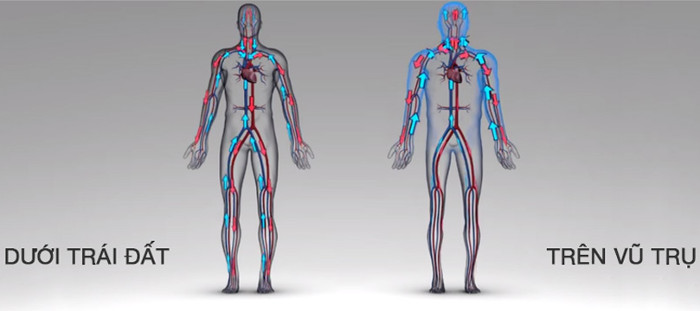The astronaut's height increased by 5cm after a year of living on the universe
Astronaut Scott Kelly has returned to Earth after nearly a year of living in the universe and it is found that his height has increased by 5cm. The reason is that below the Earth, the plates of the spine are compressed by gravity and in the zero gravity environment, the compressive force is no longer available so the plates relax, the spine stretches out and finally, the height increases. up.
Last year, Scott Kelly was taken to NASA by the NASA space station and began a year-long mission on it. All information about his physical and mental health is always monitored and recorded in order to study the impact of long-term space travel. Around the same time, one of his twin brothers, Mark under the Earth, was constantly being monitored as a basis for comparison.

Astronaut Scott Kelly is 5cm tall after living in space.
Now, Scott Kelly has been brought to Earth with the health situation reported to be stable. By comparing the characteristics of these twins, researchers can identify all the effects of space travel on humans, especially the genetic changes. Preliminary comparison results show that compared to the twin brother living below the Earth, Kelly is 5cm taller.
However, unfortunately, the height increase effect with Kelly astronaut is only temporary. Once he returned to Earth a long enough time (this still needs to be determined, but scientists speculate it might last a few months), gravity on our planet will pull him. return to normal height as before).
In 2013, NASA began promoting a study to find out why astronauts are higher, by focusing on the spine. Currently some studies on this issue are still ongoing.
After returning to Earth, Mr. Kelly will become the subject of research by scientists to find other changes, likely to occur with his body during his stay in space, including Changes related to eyesight, bone and brain. Researchers also want to find out, Mr. Kelly is actually younger than his twin brother Mark Kelly 0.01 seconds as Albert Einstein's relativity theory.
Knowing what happens to the human body in a long-term micro-environment will help experts understand how they need to be prepared for astronauts to join longer missions, for example. like an adventure to Mars, in the future.

When he returned to Earth, Scott Kelly was 5cm taller, while the height of his twin brother Mark Kelly remained the same.(Photo: Word Press).
While specific comparative results will be published in the near future, let us take a look at the effects of space travel on human health proposed by the US Institute of Space Biology and NASA:
- Crunchy bones : Astronauts do not use their feet to float and float in a zero gravity environment, so the load capacity of leg bones, hips and spinal column of astronauts will decrease significantly. Therefore, bones become weak, and the body releases more calcium, leading to an increased risk of kidney stone formation.
- Muscle weakness : Due to long-term living in space, the legs and back are not exercised so the muscles begin to weaken and atrophy, leading to an increased risk of injury and accidents.
- Swollen face : In space, blood in the upper part of the body flows more, the lower part flows less. Therefore, astronauts often have swollen faces while the leg circumference will decrease.
- Smaller heart : in the universe, the heart works more gently and if prolonged, the heart size will decrease. On the other hand, it is thought that cosmic radiation may affect the pericardium, arterial mucosa, and the risk of cardiovascular disease.
- Balance mechanism : The inner ear is very sensitive to gravity, so when the space is too long, some functions will no longer work properly. At the beginning of the universe, astronauts can be disoriented, lose their sense of navigation and dizziness, nausea. When they return to Earth, they have to get used to gravity and when it is difficult to walk.
- Increased risk of cancer due to radiation exposure in the universe.
- Biological arrhythmias because there is no concept of space 24 hours a day.
- Higher : If below the Earth, the spinal discs are compressed due to the effect of gravity, when the universe is compressed, the compressive force is no longer so the disks tend to expand. As a result, the spine lasts and the astronaut will rise.
- Little things tear up when living in the universe
- At 9 cm tall in the universe, Japanese astronauts apologize
- American astronauts break the record of living in the universe back to Earth
- Men are 11cm taller from the 1870s
- Astronauts have many problems with their eyes and brain
- Astronauts live 1 year on the universe to Earth safely
- Astronauts tall up to 9cm after only 3 weeks living on the space station
- Something you don't know about life in the universe
- How long can man live in the universe?
- NASA conducted the most difficult experiment in history
- Astronauts welcome the new year at the international space station
- Chinese astronauts will lecture from the universe
 Van Allen's belt and evidence that the Apollo 11 mission to the Moon was myth
Van Allen's belt and evidence that the Apollo 11 mission to the Moon was myth The levels of civilization in the universe (Kardashev scale)
The levels of civilization in the universe (Kardashev scale) Today Mars, the sun and the Earth are aligned
Today Mars, the sun and the Earth are aligned The Amazon owner announced a secret plan to build a space base for thousands of people
The Amazon owner announced a secret plan to build a space base for thousands of people